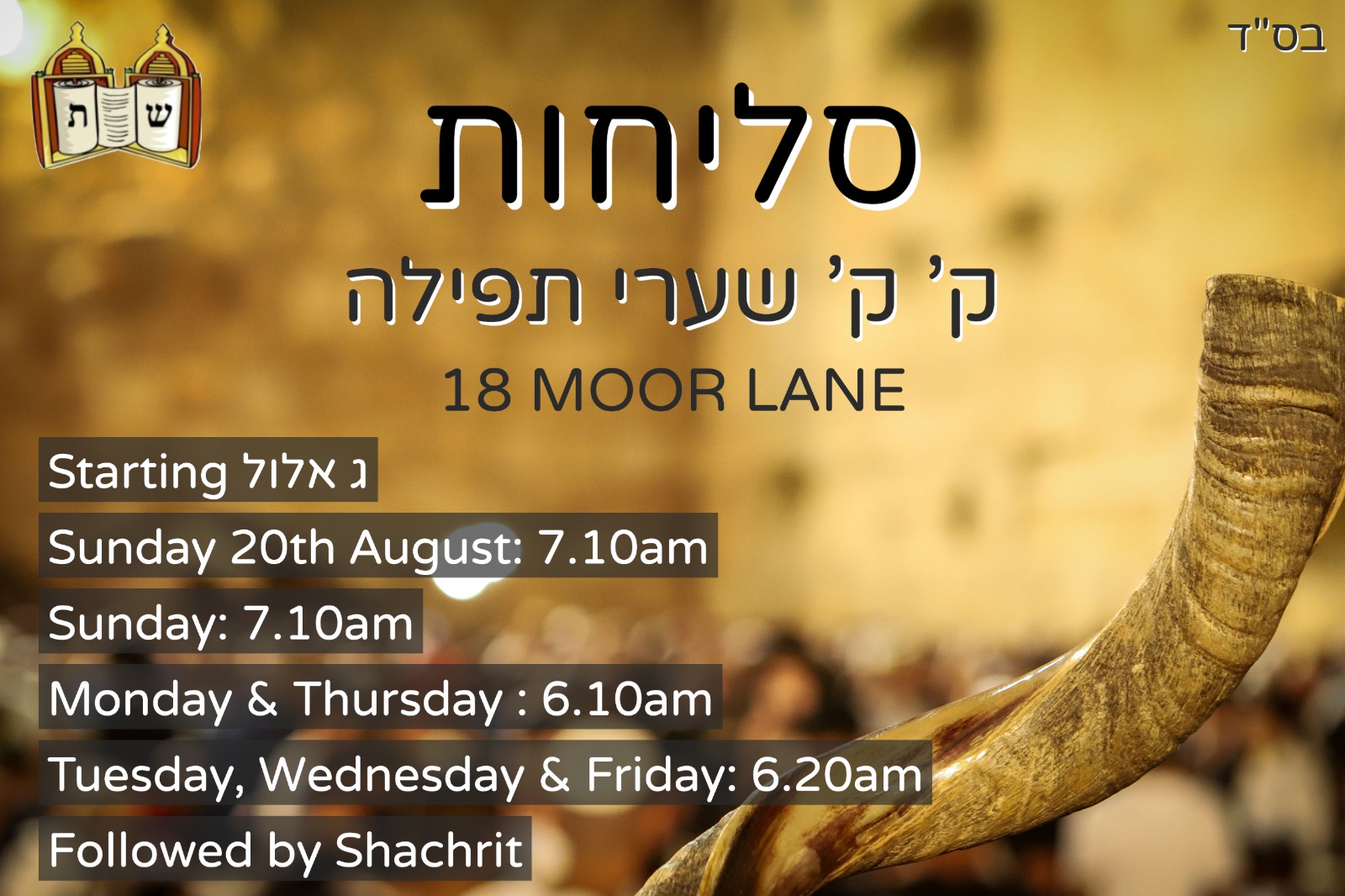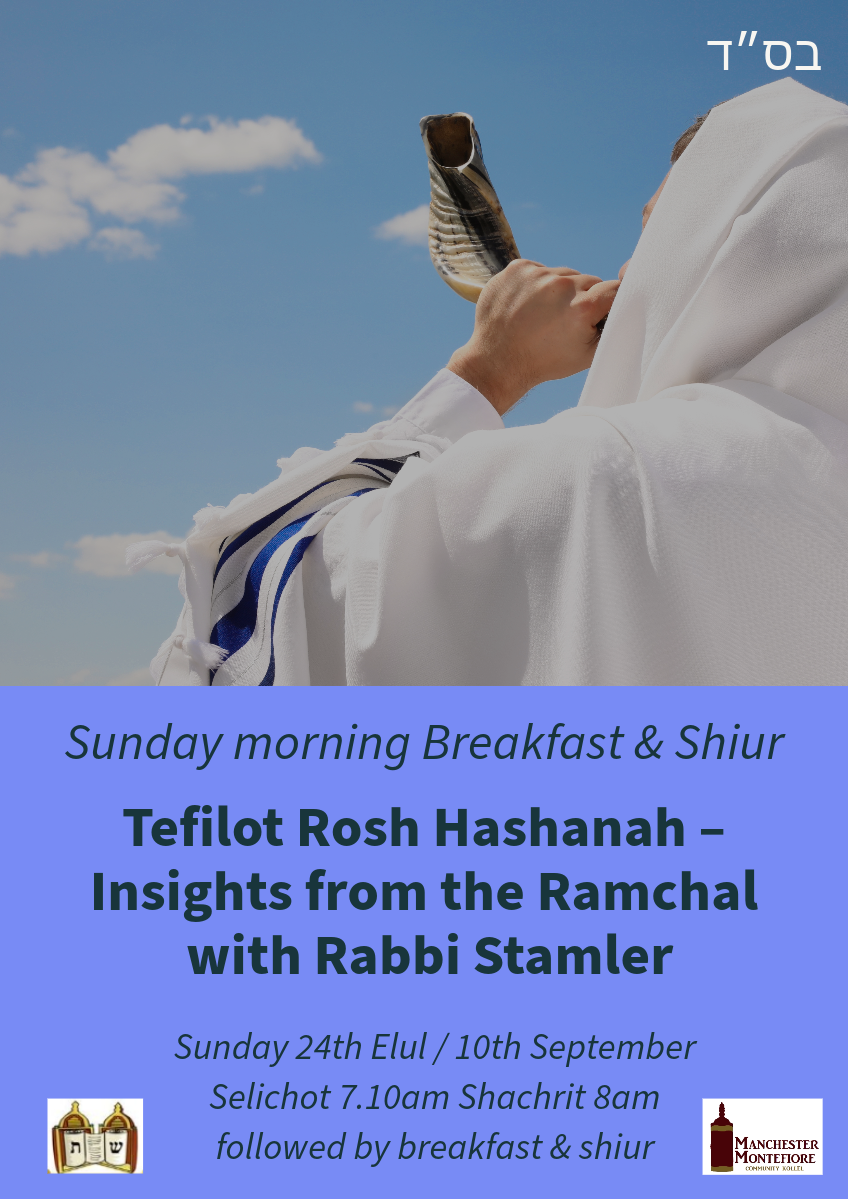
ק׳ ק׳ שׁערי תפילה





מן השמים תנחמו
אריכות ימים

Times for Rosh
Hashana & Yom Kippur תשפ״ד 5784
– 2023

לוח זמני תפלה לקיץ תשפ״ג
Summer Timetable 5783 – 2023
מוצאי שבת | ערבית )מוצ”ש( | סוף זמן קראת שמע | זמן שבת | פלג מנחה (תה״ד) | פלג מנחה (לבוש) | מנחה וקבלת שבת | תאריך | שבת פרשת |
Shabbat Ends | Arbit | Shema to be read before | Candles to be |
| Earliest Candle lighting | Minha & Kabbalat Shabbat* | Date | Parasha |
PM | PM | AM | PM | PM | PM | PM |
|
|
8:31 | 8:17 | 9:48 | 7:27 | 6:51 | 6:21 | 6:51 | 8/9 Sep | נצבים־וילך |
For those not in the Bet Hakeneset, but wishing to bring in Shabbat with the Kahal, candles should be lit about 30 minutes after the time listed for Minha and Kabbalat Shabbat, unless the time listed in the ‘latest candle lighting’ column is earlier, when candles MUST be lit by that time, in all cases.




Nitzavim
On the last day of his life, Moshe gathers together all the people, young and old, lowly and exalted, men and women in a final initiation. The covenant includes not only those who are present, but even those generations not yet born. Moshe admonishes the people again to be extremely vigilant against idol worship, because in spite of having witnessed the abominations of Egypt, there will always be the temptation to experiment with foreign philosophies as a pretext for immorality.
Moshe describes the desolation of the Land of Israel which will be a result of the failure to heed Hashem’s mitzvahs. Both their descendants and foreigners alike will remark on the singular desolation of the Land and its apparent inability to be sown or to produce crops. The conclusion will be apparent to all — the Jewish People have forsaken the One who protects them, in favor of idols which can do nothing. Moshe promises, however, that the people will eventually repent after both the blessings and the curses have been fulfilled. However assimilated they will have become among the nations, eventually G-d will bring them back to Eretz Yisrael.
Moshe tells the people to remember that the Torah is not a remote impossibility. Rather, its fulfillment is within the grasp of every Jew. The Torah portion dramatically concludes with Moshe's comparing the Jewish People's choice to follow the Torah to a choice between life and death. Moshe exhorts the people to choose life.
Vayelech
On this, the last day of his life, Moshe goes from tent to tent throughout the camp, bidding farewell to his beloved people, encouraging them to keep the faith. Moshe tells them that whether he is among them or not, Hashem is with them, and will vanquish their enemies. Then he summons Yehoshua, and in front of all the people, exhorts him to be strong and courageous as the leader of the Jewish People. In this manner, he strengthens Yehoshua's status as the new leader.
Moshe teaches them the mitzvah of Hakhel. E very seven years, on the first day of the intermediate days of Succot, the entire nation, including small children, is to gather together at the Temple to hear the King read from the Book of Devarim. The sections that he reads deal with faithfulness to G-d, the Covenant, and reward and punishment. G-d tells Moshe that his end is near, and he should therefore summon Yehoshua to stand with him in the Mishkan, where G-d will teach Yehoshua. G-d then tells Moshe and Yehoshua that after entering the Land, the people will be unfaithful to Him, and begin to worship other gods. G-d will then completely hide his face, so that it will seem that the Jewish People are at the mercy of fate, and that they will be hunted by all. G-d instructs Moshe and Yehoshua to write down a song — Ha'azinu — which will serve as a witness against the Jewish People when they sin. Moshe records the song in writing and teaches it to Bnei Yisrael. Moshe completes his transcription of the Torah, and instructs the Levi'im to place it to the side of the Aron (Holy Ark), so that no one will ever write a new Torah scroll that is different from the original — for there will always be a reference copy.
Ohr Somayach Institutions www.ohr.edu

ההכנות לימי הדין
בימים הסמוכים לימי לראש השנה, על כל אחד ואחד מעם ישראל, להתבונן על מעשיו, לעשות “חשבון נפש”, כדי לבחון במה יוכל לתקן את מעשיו ולשפרם, על מנת שלאחר מכן, יעמדו לו סניגורים טובים ליום הדין.
משמעות השם “אלול” כתב מרן הרב עובדיה יוסף זצוק”ל, ש”אלול”, כלומר, משמעות השם של החודש “אלול”, היא מלשון “יאללון” שהוא התרגום הארמי למה שנאמר אודות המרגלים “ויתורו” את ארץ כנען, “ויאללון” ית ארעא דכנען, כלומר, לשון ריגול וחיפוש אחר מעשיו. כי בחודש אלול, מנהג ישראל קדושים לתור אחר מעשיהם, ולבקר את עצמם, כי הם הימים המיוחדים והמסוגלים לתיקון העונות, לחזרה בתשובה שלימה, ולעלות מעלה מעלה בדרך העולה בית אל.
ויש לאדם לעורר את עצמו ולהתנער מתרדמת השגרה הנופלת עליו במסע החיים האפלוליים, כי כמה השתדלויות כל אחד עושה כדי לשפר את מצבו החומרי, בקניית בית או רכב, ובהשקעת כוחותיו עבור מאכלות ערבים, טיולים ובילויים וכיוצא בזה, וכל מה שפועל ועושה, הכל כאין וכאפס לעומת מה שישפר את מצבו החומרי והרוחני כאחד, בעזרת התפלות לאל נורא עלילה בימים הנוראים הללו. וכמו שכתב הגאון החזון איש, שעל ידי התפלה, האדם פועל להטיב את מצבו יותר ממה שיוכל לפעול על ידי השתדלות טבעית שנראה לעין כל שהשתדלות זו מועילה.
וכבר כתבנו כמה פעמים שיש להזהר להעביר את כספי הצדקה לאנשים אחראים, בכדי שיעבירו את המעות לעניים אמתיים, ואין לסמוך בזה על כל אדם, אפילו אם הוא מתהדר כביכול בהמלצות גדולי הדור.
Preparing for the Day of Judgment
During the days preceding Rosh Hashanah, every single member of the Jewish nation must contemplate his/her actions and perform some sort of self-introspection in order to ascertain how one can improve one’s actions and Mitzvah observance so as to guarantee one’s self powerful defenders on the Day of Judgment.
The Meaning of the Word “Elul”
Maran Rabbeinu Ovadia Yosef zt”l writes that the word “Elul” is similar to the Aramaic word “Ve’Alilu,” which is the Aramaic translation of the verse which is said regarding the spies sent to the Land of Israel, “And they spied the land.” This means that “Elul” connotes searching through and probing one’s actions. During the month of Elul, it is the custom of the holy Jewish nation to probe their deeds, for these days are auspicious for atonement of sin, attaining full repentance, and reaching loftier levels of spirituality and service of Hashem.
Prayer During the Month of Elul
Certainly, praying copiously and repenting for one’s sins are extremely beneficial for every individual and these things will defend an individual during the upcoming Days of Judgment of Rosh Hashanah and Yom Kippur. These will be one’s guarantors that one will be inscribed in the books of life, wealth, satisfaction, and the fulfillment of all of one’s requests.
One must awaken himself from the slumber which comes along with one’s daily routine throughout life; one should stop and think how much we invest on increasing the quality of our physical lives by purchasing new cars or homes, focusing on obtaining only the finest culinary delights, and going on all sorts of trips and vacations. All of this is nonsense compared to the Heavenly key to advancing one’s physical and spiritual status as one through deep and heartfelt prayer to Hashem during these Days of Awe. Similarly, Hagaon Chazon Ish writes that a person can improve his situation much more through prayer than through any other natural means that he believes may assist him.
Repentance, Prayer, and Charity
Our Sages teach us in the Talmud Yerushalmi (Ta’anit, Chapter 2), “Rabbi Elazar says, three things nullify harsh decrees: Prayer, charity, and repentance.” He continues to bring proofs to this idea from the scriptures. Thus, one should practice these three things, i.e. prayer, charity, and repentance, profusely during these days, as the hymnist writes, “Repentance, prayer, and charity shall annul the harshness of the decree.” The source for this is the aforementioned Talmud Yerushalmi. Maran zt”l writes that although in previous generations, people would fast many times during these days in the spirit of “repentance,” nevertheless, in our times when it is difficult for people to fast, one should increase one’s donation of charity instead. Indeed, it is better to give more charity in our times than to fast, for by fasting, one decreases his service of Heaven (for fasting weakens the body).
We have already mentioned several times that one should take care to pass along charity funds to responsible individuals so that they will in turn dispense these funds to truly needy people and one should not rely on every individual regarding such matters, even if one seemingly comes with the recommendation of the generation’s leading Torah leaders.